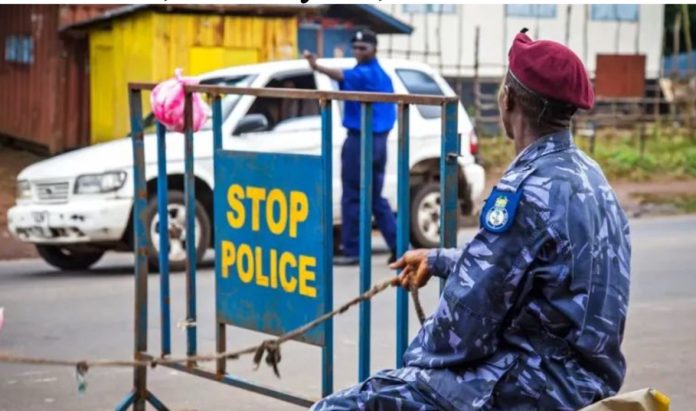AYV News, January 24, 2025
Director of Traffic Management and Road Safety in the Sierra Leone Police, Commissioner of Police (CP) Abdul Moijue has sent a strong warning to personnel of the Force, especially those attached to the Traffick Division not to collect bribes from drivers.
C. P Abdul Moijue said: “We do not send them in the streets to collect money, we send them to do Police work (control traffic and enforce law), so if you see them collecting or extorting money from drivers, report them to the Complaint Discipline and Internal Investigations Department (CDIID) with evidence. Disciplinary measures will be taken against them in line with the 2001 Police Disciplinary Regulations”.
The C.P’s warning came amidst several accusation levied against the Force’s traffic division of sliciting bribes from commercial motor drivers, bike and kehkeh riders.
Earlier, the Executive Director of the Institute for Governance Reform (IGR), Andrew Lavali, conducted a research where he surveyed the experiences of five hundred motorists and selected few enforcement agents and also looked at drivers’ experiences with the police, particularly whether they paid bribes, how much they paid, why they were pulled over, their knowledge of what to do when pulled over as well as suggestions for better police-motorist relations.
The methodology used by IGR as explained by its Executive Director lends credence to that report. What the report unearthed will not surprise most Sierra Leoneans, especially drivers, passengers and in lookers who often witness what obtains between commercial drivers and traffic officers in terms of traffic offences and bribery.
According to the report, “Nearly three in five drivers said they pay bribes when stopped by the police.” This again can be testified by the general public, particularly passengers who often witness the scenes of police harassment of drivers that commit traffic offences. Drivers would prefer to bribe the police so that they would not be charged to court where they would levy heavy fines on them. Only drivers that refuse to bribe the police for traffic offences will be dragged to court except the vehicle owners are authorities or affluent people in society. For example, I have never witnessed or seen drivers of commercial vehicles owned by police officers been arrested or charged to court for traffic offences. And there are hundreds of police officers, including traffic officers that own commercial vehicles and I stand to be corrected.
Bribery for traffic offences in Sierra Leone, as rightly observed by the Executive Director of Centre for Accountability and Rule of Law (CARL) during the launch of the report, has a domino effect and it is the poor and ordinary people who are bearing the brunt because eventually, taxi and Poda-Poda drivers will ask passengers to double or triple regulatory or official fares for distances in order to meet the demand of extortions. Most Poda Poda and taxi drivers plying the east end Freetown routes, for instance, have the notoriety for asking vulnerable passengers to double or triple their fares from Calaba Town or Wellington to Eastern Police or Sackville Street.
The IGR Researcher and Policy Director remarked that “if we refuse to pay bribes corruption will stop.” That could be possible in certain sectors but it is very difficult not to pay bribes in the traffic sector given the number of traffic offences committed by lawless commercial drivers on daily basis. Defaulters would simply pay the traffic officer so that they won’t be taken to court where they would be found guilty and pay heavy fines or even be sent to remand or prison.

